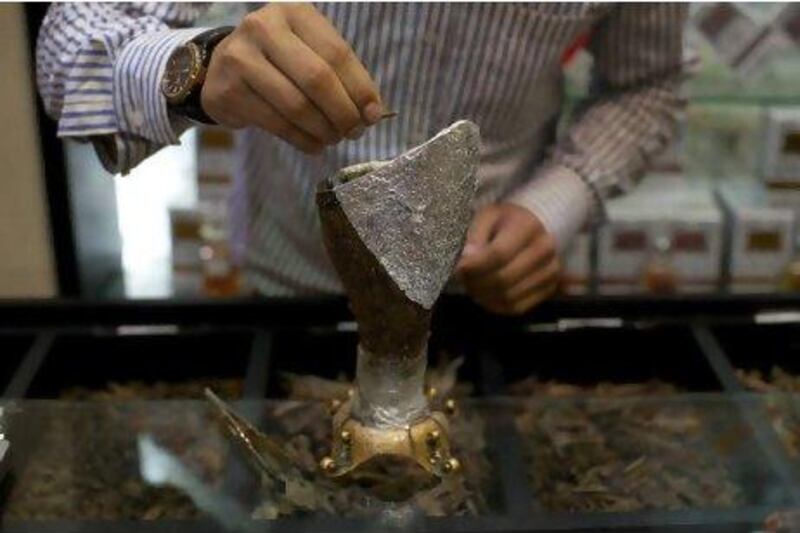DUBAI // Officials are investigating whether burning traditional Arabian incense at Ibn Battuta Mall is harmful to the public.
A spokesman for mall owners Nakheel said bosses were also speaking to tenants at the single-storey mall to resolve the issue.
There are at least five shops in the mall burning the incense, known as bakhour or oud, most of the day.
Research is being carried out by scientists in the US over the health effects. There are signs that it is linked to neurological and respiratory problems.
Many customers have complained to shops over the smell, and some say they try to avoid the mall.
A spokesman for Nakheel said: "This issue is being reviewed by our specialised team to study the effect of bakhour burning on the health of the mall visitors, and how to manage this issue with the tenants."
Further details about the review, or negotiations with tenants were not immediately available.
A recently published study of indoor air pollution in homes in the Emirates, found that those who burn bakhour or oud at least once a day, were two to four times more likely to suffer from headaches, forgetfulness or concentration problems.
The study found levels of formaldehyde, hydrogen sulphide and sulphur dioxide were especially high in the homes of those who burnt incense regularly.
In separate studies, researchers have also found particles of carbon monoxide in the smoke - the same substance produced from car exhausts.
Karin Yeatts, an assistant research professor at the University of North Carolina, carried out the UAE study on behalf of the Environment Agency-Abu Dhabi. She said master's students at her university were currently conducting research on the contents of bakhour smoke.
She said one of her students had found certain particles were the same as those released from cigarettes. "This still has to be validated and published, but breathing this in could be like being exposed to tobacco smoke," she said.
Other studies from Saudi Arabia have found that bakhour smoke damaged the lungs of laboratory rats and altered their metabolism.
A study in Oman found a link between bakhour and an rise in asthma symptoms among children.
Professor Omar Al Rawas, dean of medicine at Sultan Qaboos University, said that in 40 per cent of cases where a child already had asthma, the smoke from bakhour made them worse.
He said that recent findings may imply that there were health implications from burning the incense.
However, he said that it would be wrong to introduce a public ban, because there was still no definite proof.
"All the research taken together, could mean that bakhour is hazardous to health," he said. "Still, there's not enough evidence to regulate its usage.
"You look at all the evidence that smoking is harmful to health, but people are still struggling to have it banned in public areas."
He said that the problem was also compounded because there were so many different types of bakhour, with a wide range of different ingredients.
Dr Joan Soriano, from the Epidemiología e Investigación Clinica in Mallorca, Spain, contributed to a study in Abu Dhabi that found a tentative link between the burning of bakhour in homes and chronic respiratory problems.
He said it was possible people in malls could develop health complaints from inhaling the smoke over a long period of time, but said that the effect would depend on a number of variables.
"In respiratory diseases, everything depends on the intensity and the duration," he said. "Whether the area was well ventilated or not would also play a role."
At one shop in Ibn Battuta mall where incense was burnt throughout the day, a sales assistant who requested anonymity said he had initially found the role difficult.
"At first it was very irritating for my throat, but now I'm used to it," he said.
"Many of the local people here love the smell of the incense, but there are complaints from some people, mostly Europeans."
A worker at a different shop said she had reported no health problems, despite working with the incense for eight hours a day, six days a week.
"I don't mind it at all, but one of my colleagues always gets sick," the worker said. "She blames it on the incense."





